Audio and Video Copyright © 2018 The Foundation for Apologetic Information and Research, Inc. Any reproduction or transcription of this material without prior express written permission is prohibited.

August 2018
I want to begin by expressing appreciation to all those who promote faith in the Lord Jesus Christ and in His restored Church by providing faithful answers to critical questions, including FairMormon. Independent voices are needed in reaching out to those among us who are struggling to find and sustain faith, and in responding to those who unfairly criticize, misrepresent, distort, and demean the history, doctrine, and leadership of The Church of Jesus Christ of Latter-day Saints.
More needs to be done to increase awareness of, access to, and confidence in these independent, trusted resources by Latter-day Saints and seekers of truth.
Perspective is a way of looking at things. Perspective has a Latin root meaning to ‘look through’ or ‘perceive.’ This morning I want to give you a perspective about one of the greatest challenges of all time, and our sacred and imperative duty to it: the challenge of taking the Gospel of Jesus Christ to all the world! The gathering of all scattered Israel is the greatest and most powerful force for good on the earth. And, in the end, it will succeed miraculously and powerfully.
Our Sacred and Imperative Duty
We know the destination; however, the detailed roadmap is still being revealed. We believe that God will yet reveal many great and important things pertaining to the Kingdom of God (AF 9). President Russell M. Nelson taught that “Our Savior and Redeemer, Jesus Christ, will perform some of His mightiest works between now and when he comes again. We will see great and miraculous indications that God the Father and His Son Jesus Christ preside over this Church in majesty and glory.” This is their work. But we have a sacred duty to do our part. There has never been a better time to be alive and to be a member of the Church of Jesus Christ. Notwithstanding, we also live in a time of great turmoil and confusion. Many are struggling to find purpose and peace. The world is suffering from moral and spiritual decay. There are so many conflicting and contentious voices and influences competing for our attention. We all have an important role to play in helping others find peace amid the confusion.
During the extremely dark and difficult early days of the Church, Joseph Smith penned these words from Liberty Jail:
…it is an imperative duty that we owe to all the rising generation, and to all the pure in heart—
For there are many yet on the earth among all sects, parties, and denominations, who are blinded by the subtle craftiness of men, whereby they lie in wait to deceive, and who are only kept from the truth because they know not where to find it (D&C 123: 11-12).
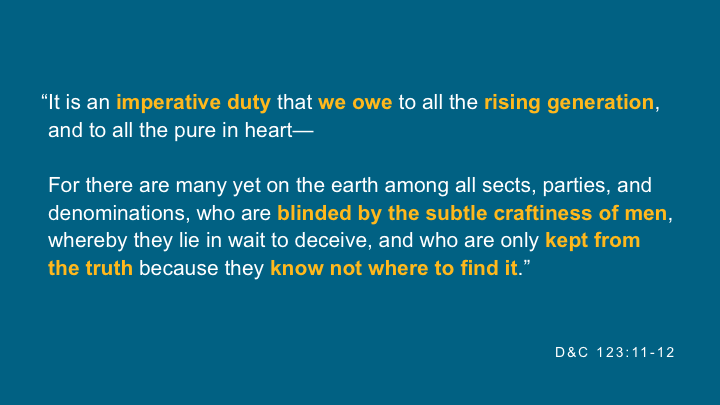
This sacred and imperative duty is personal, as well as institutional. The word imperative suggests required, necessary, and unavoidable.
What lies at the heart of this sacred and imperative duty we each have?
As our understanding of the Atonement of Jesus Christ grows, our desire to share the gospel with others increases, and we feel as Lehi did when he expressed, “how great the importance to make these things known unto the inhabitants of the earth…” (2 Nephi 2: 8). Those who have made sacred covenants have a sacred duty “…to bear one another’s burdens, that they may be light; to mourn with those that mourn…comfort those that…need comfort, and to stand as witnesses of God in all times and in all things, and in all places…” (Mosiah 18:8-9). Our duty is anchored in the first two great commandments: to love God and to love others as ourselves.
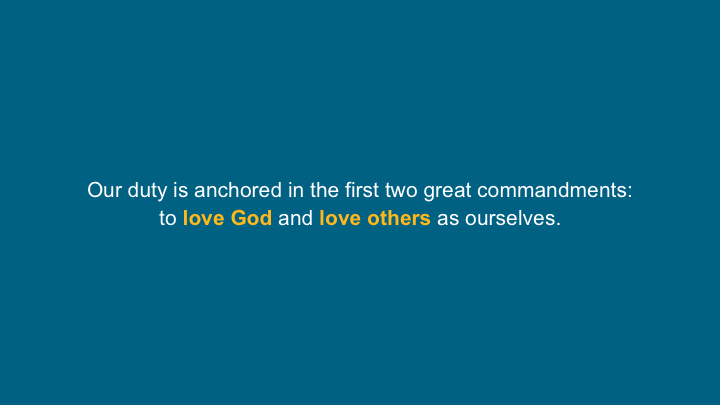
What is the message that is so sacred and imperative to share?
President Nelson recently stated: “Our message to the world is simple and sincere: we invite all of God’s children on both sides of the veil to come unto their Savior, receive the blessings of the holy temple, have enduring joy, and qualify for eternal life.” It is the most important message in all the world! Communicating this vital message to the world is a massive challenge with at least two key obstacles.
Awareness and Understanding
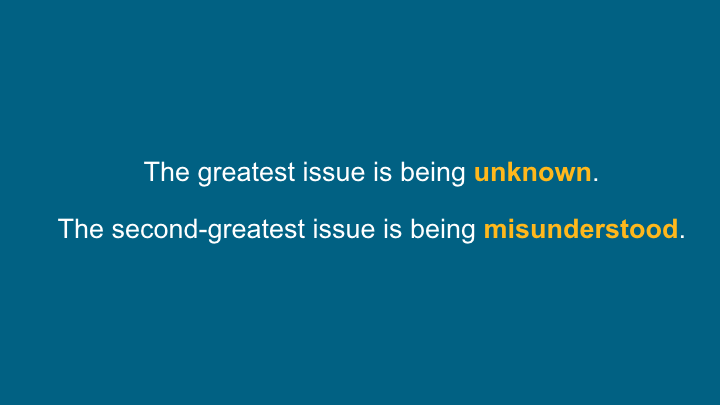
The first obstacle is being unknown – the second is being misunderstood. In other words, awareness and understanding are the key obstacles to us meeting our sacred and imperative duty. The scale and magnitude of this challenge is beyond anything the corporate world has ever encountered.
When the Savior first commissioned His apostles to “Go ye therefore and teach all nations” (Matt 28:19), there were only an estimated 1 million inhabitants on the earth. By 1830, the Church was restored and the population had increased to nearly 1 billion. In less than 200 years that number has soared to 7.6 billion people inhabiting the earth. Do you think it’s a coincidence that our merciful Heavenly Father waited until after the Restoration to bring most of His children to earth? There has never been a better time to live!
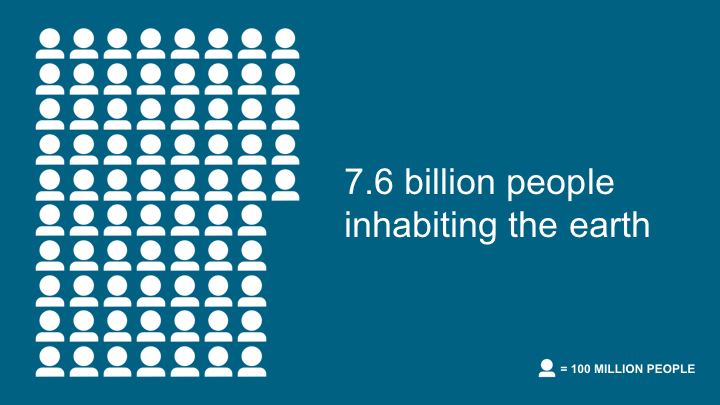
However, our best estimates suggest that as many as 6.6 billion may have never even heard of the Church of Jesus Christ of Latter-day Saints. They are completely unaware of its existence. Effectively communicating the message of the Restored Gospel may seem like an overwhelming task!

Of the remaining 1.0 billion people who likely have heard of the Church, approximately half have an unfavorable impression about us.


Although 70% of the inhabitants of the earth are not accessible to missionaries, over 50% have access to the internet, and over 2/3 have a mobile phone. The average internet user is spending six hours per day using internet-powered devices and services. Technology will be a key to overcoming the challenge of awareness.

While we await more revelation on how the Lord plans to make this great and marvelous work known to all the inhabitants of the earth, we must ensure that the honest in heart can efficiently find and embrace the restored gospel online. Surely this deserves our very best collective efforts. We have much work to do here. However, if misunderstanding grows faster than awareness, that will be difficult. We must do better in addressing the second obstacle of understanding. This deserves our very best collective efforts. We have a lot of work to do, as the following example illustrates.
Just Google It
Pretend you are John, a 23-year-old socially conscious recent graduate beginning your career on the east coast. As you move on to the next stage in life, you begin thinking about spirituality. The missionaries contact you, and you agree to meet with them. You have an engaging and enlightening discussion with them in your apartment and agree to meet again soon. You subsequently mention this to a good friend who warns you that Mormons are racist. Curious and intrigued, you obviously google it.
As you review the results of your search, you see that there must be some truth to this, based on the nature of the results:
- “The new face of Mormon racism”
- “The History of Racism and White Supremacy in the Mormon Church”
- “Racism in the Mormon Church”
Just to name a few.
These results all look interesting, but, you’re really not that interested in reading a bunch of articles. You would rather watch a video. So, you switch to YouTube and do the same search.
Again, there seems to be a lot content on the issue, but nothing from the Church itself. The HuffPost entry appears first, so you click on the Huffpost video.
This is your first exposure to the fact that, for a time, the priesthood was not conferred upon black men. A list of other suggested videos on the topic appear to be somewhat consistent. Wanting to give the missionaries the benefit of the doubt (which rarely happens), you take the pass along card they left and type in Mormon.org.
The results on Mormon.org show a complete blank on the issue and you begin to wonder why you found so much on the google and YouTube search. Still curious, you use the “ask a friend” option on Facebook, where you quickly get lost in a sea of blogs.
Even if you were amazingly persistent and somehow found lds.org, you may only find a very recent blog post on Healing the Wounds of Racism, but not the Gospel Topics essay written on this topic or any Church Newsroom articles. Good content often does exist, but it can be very difficult to find, and often does not address key questions in consistent and engaging ways.
We have failed John in this scenario. Missionaries confront scenarios like this every single day, in every language in the world. Now, not all topics are this problematic, and, in fact, this scenario may look much different today with the recent ‘Be One’ celebration that took place on June 1 of this year. We need to create and promote content that effectively communicates what we believe and why in clear, authentic and engaging ways, especially on some of the most prevalent search topics. Too often our content uses words and expressions completely unfamiliar to those outside the Church. We don’t need a deep doctrinal dive to address basic questions.
Here is an example of someone who is willing to speak up and address some basic, but important questions and issues about our beliefs. Her content is straightforward, clear and authentic. She simply uses her own voice and speaks from her heart.
The internet has become the most powerful and dominant source for information on virtually any topic or question. The inherent problem with this reality is that much inaccuracy comes from limited experience, understanding, or viewpoint, and even due to intentional desire to mislead or misrepresent. The internet can either lead individuals to the truth or away from it. This is where independent organizations like FairMormon and individuals can make a significant contribution. Church produced content might appear more polished and professional, but yours will be viewed as more authentic! Because what you say comes with your personal experience and unique perspective, it enlivens content produced by the Church.
Key Topics
Research indicates that most misunderstanding about the Church can be tied to a relatively few key topics like:
Church History, Temples, Garments, Joseph Smith, Polygamy, Prophets, Women, LGBT, and Transparency just to name a few obvious ones. As you might imagine, each of these core topics has a myriad of related subtopics. As you might suspect, racism, the focus of our scenario with John, is one of these topics. Information, both positive and negative, about these topics are accessed through search engines and on YouTube. These platforms are the primary sources of information in our time. We simply need more effective, engaging, and faithful content in more languages and cultures that can be easily found on these platforms – content that clearly communicates what we believe and why it is important in a positive and personal way. The Church can’t possibly produce all the content needed. We need your help and your voices. Are you starting to see the magnitude of this challenge?
Perceptions of the Church will continue to be driven, at least in part, by personal experiences and perspectives shared and discussed through social media. This is how information is discovered and evaluated in our time. To counteract and overcome misunderstanding, the Church, its members, and other independent, faithful voices must be proactively and effectively engaged on all media platforms. This is part of our sacred and imperative duty to the rising generation and to the pure in heart.
I hasten to add that addressing these topics more effectively with more content will not, in and of itself, build faith in the Savior. Developing faith is an individual spiritual process. However, access to understandable answers to critical questions and concerns can help correct misunderstandings about the Church and remove stumbling blocks to faith. It can also level the playing field for the sincere truth seeker to find and recognize the gospel, in a world increasingly hostile to faith.
No Flagrant Personal Fouls
Much of the content needed for websites and YouTube must come from independent sources like FairMormon and individual members of the Church throughout the world. This is an international problem. Your voices must be heard on social media, wherever you live.
Years ago, Elder Neal A. Maxwell stated: “There should be no more uncontested slam dunks” against the Church and its doctrines. However, we need not commit flagrant personal fouls in the process. Adding to contention is not the answer. Yet, we can be bold, resilient, compassionate, and thoughtful with our voices. Personal experience is always more authentic and persuasive and personal testimony will always be more powerful, if offered in love.

How Can We Help?
How can we help those who have heard of the Savior’s Church and are struggling to develop or sustain faith in a world increasingly hostile and opposed to religious beliefs?
Father Lehi emphasized: “…there must be an opposition in all things.” It is a necessary part of the divine design. Three of Satan’s most effective tools are Distraction, Deception, and Spiritual Desensitization. Each of these play a key role in addressing the challenge of building awareness and overcoming misunderstanding. Four key principles help us know where to begin.
- Heavenly Father’s Plan for our ultimate happiness is intended for all His children. It is available to each one individually. This is not a numbers game. It is about reaching and redeeming individuals one by one.
- The Family: A Proclamation to the World declares that: “In the Premortal Realm spirit sons and daughters knew and worshipped God as their Eternal Father and accepted His plan…” Every inhabitant of the earth knows that the Gospel of Jesus Christ is true, they just can’t remember. Mortal amnesia is also a necessary part of the divine design. Only the power of the Holy Ghost can help each one of us remember what we have always known to be true. This takes place one by one.
- The prophet Nephi taught: “…For the Lord God giveth light unto the understanding; for he speaketh unto men according to their language unto their understanding” (2 Nephi 31:3). Understanding comes from the light or influence of the Holy Ghost that Heavenly Father sends. The language spoken of here is a spiritual language. Our native language is a spiritual language. That is the language we all learned as spirit sons and daughters of God. By the power of the Holy Ghost we come to know again, the truth of all things. Without this spiritual power, misunderstanding will prevail, because “there is an opposition in all things.” Access to information is not the same as acquisition of knowledge and having greater access to information does not equate to greater understanding. Knowledge and understanding of eternal truths come from God through the Holy Ghost, and in no other way.
- The root cause of misunderstanding is incomplete or inadequate knowledge of the truth and an inability or unwillingness to receive it through the Spirit of Truth. To the priests of wicked King Noah, the prophet Abinadi charged: “Ye have not applied your hearts to understanding” (Mosiah 12:27). Understanding often requires more diligence, patience, humility, and trust than many are willing to commit. That leaves each of us vulnerable to doubt and disbelief and to “the subtle craftiness of men who lie in wait to deceive.”
Deception is one of Satan’s most powerful tools. He, and those influenced by him, have been effective at distorting truth, sowing doubt, ridiculing faith, and turning people away from Heavenly Father and His Son Jesus Christ from the very beginning of time. His track record of deceiving even the very elect is well documented in every dispensation. Our days will be no different.
Each of us has loved ones who are struggling with issues and concerns and some who have completely lost faith. A spouse, a child, a family member, a dear friend. How can we help them? How can we prevent this from happening to those we love, including our own selves? Over the past ten years as a General Authority, my assignments have brought me into contact with those who are struggling. I have also met those who have left the Church. I have even met those who now actively seek to destroy the faith of others drawing them away from the Church. It is both curious and tragic to observe that when some lose their faith in the Book of Mormon, Joseph Smith and Church Leaders, they don’t just leave the Church, they also lose their faith in the Savior Jesus Christ and turn away from Him.
In virtually every instance, the process of falling away began with an issue or concern about a Church policy, practice, leader or historical question. None of us is immune to this. I am reminded of a quote from George MacDonald often attributed to CS Lewis: “For nothing is so deadening to the divine as a habitual dealing with the outside of holy things.” This seems to aptly describe so many detractors of the Church and the issues they choose to focus on.
Lessons from My Black Box
Years ago, I found myself starting to do the very same thing. I began to focus on two or three concerns. Questions about things like the practice of polygamy, certain historical issues and several abstract doctrinal issues concerned me. The more time I spent focusing on these issues and concerns, the more the list seemed to grow. I began to think about where this path might lead me. One day a powerful thought came to mind quite forcefully: “Don’t let something you don’t currently understand unravel everything else you do know!”
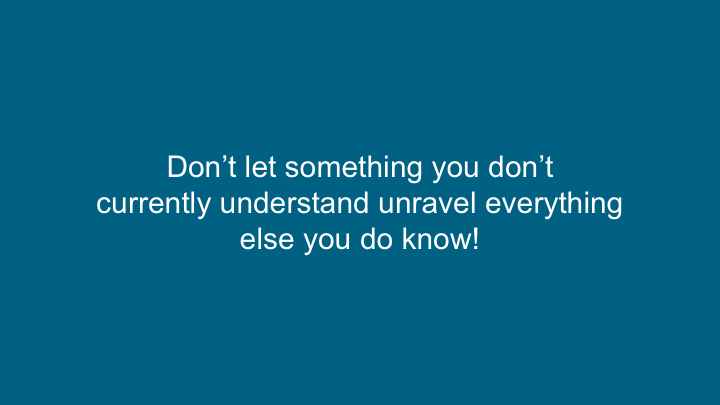
In that moment I realized I had a very important decision to make. I knew that I had received a personal witness from the Holy Ghost on the questions that matter the most. And I was determined to remain true and faithful to that knowledge, come what may. That has made all the difference in my life. But, I still had the same questions and concerns and I decided I needed a place to put them.

I have a black box, into which I put issues, concerns, and questions I cannot resolve. Every now and then, I open the box and think about its contents. Over time, as I have had more life experience; studied, pondered and prayed more about the doctrines and principles contained in the restored gospel; and listened and learned from Apostles and prophets, from those who know, I have come to know and experience more about personal revelation and the gift of the Holy Ghost and come to know Heavenly Father and the Savior more intimately. Today I still have a black box. Most all of the contents have been resolved. Some I see very differently now, and others just don’t seem to matter anymore. However, others are still there. But they don’t prevent me from moving forward with faith.
Now, I want to be clear. As Elder Ballard stated in a 2016 address to CES Educators, “Gone are the days when a student asked an honest question and a teacher responded, “Don’t worry about it!” Suppressing or deflecting honest questions, issues, and concerns is not helpful. One of my primary messages this morning is that there are thoughtful, faithful answers to virtually every question, issue, and concern being raised by critics and skeptics of the Church. FairMormon is an excellent source, and there are others, as well. More needs to be done to ensure better awareness of and access to these resources, so that those who are seeking answers to questions don’t have to rely on getting them from those without faith and avoid unnecessarily filling their own little black boxes. These answers need to be available where people are searching. They are searching on the internet and social media. Still, some questions require patient faith and further revelation. That is precisely why President Nelson has urged each of us “to stretch beyond our current spiritual ability to receive personal revelation” (Revelation for the Church, Revelation for Our Lives, April Conference 2018).
I have learned the importance of always looking through the lens of faith. I have learned the importance of staying focused on the primary questions and avoiding the distraction of lesser issues and concerns. I am learning about the importance of keeping my sacred covenants, following the Savior, and trusting Him and Heavenly Father. I have embraced the Lord’s promise given to Thomas B. Marsh in the Doctrine and Covenants: “Be thou humble; and the Lord thy God shall lead thee by the hand and give thee answers to thy prayers.” (D&C 112:10). And so, He has, and He continues to do so.
Daily Habits
Several months ago, one of our former missionaries called and asked for an appointment to visit in my office. He said he was struggling and needed my help. I readily offered my love and assistance. When he arrived, I greeted him warmly and invited him in to my office.
“How can I help you?” I asked.
“President, I am really struggling. I don’t even know where to start. My life is a mess and I feel like I have lost my faith. I need your help. I need a blessing.”
“Of course!” I replied. “May I ask a few questions first?”
He nodded.
“Did you have a personal prayer this morning before you left?”
“No,” he replied.
“Ok, how about last night? Surely you have had a recent prayer about our meeting?”
“Actually, President, it’s been a little while since I last prayed.”
“Can you share with me something you have recently read from the Book of Mormon?”
“Actually, it’s been a while since I last read the Book of Mormon.”
“Ok. How was Church last week? Are you attending Church?”
“No, it’s been awhile since I last attended.”
“Do you know the name of your bishop?”
“No,” he replied. “I am not exactly sure which ward I am in.”
“Can I safely assume that you also have not been to the temple for a while too?”
“Yes, it’s been quite a while, President. I don’t really have a temple recommend.”
“So, let me see if I understand,” I replied. “You’ve stopped praying, reading the Book of Mormon, and attending Church. You’re not worthy to go the temple and you have some things you need to resolve with the bishop. Is that right?”
“Yes, sir, I guess that’s true.”
“Elder, you spent two years of your life teaching people to pray, read the Book of Mormon, attend Church and keep the commandments. You promised them blessings as they did so. Do you remember any of that? Did you believe what you told them? You have stopped doing all of those things and yet you wonder why you are struggling?”
I requested that he agree to do four things over the next two weeks, at which time we would meet again and begin to address some of the problems he was facing.
- Have a meaningful personal prayer each morning and night to discuss his feelings and circumstances and to seek help.
- Read something from the Book of Mormon each day for at least fifteen minutes, every day.
- Contact his bishop and meet with him.
- Attend church.
I gave him a blessing and told him again that I loved him. We agreed to meet in two weeks. The day before our next meeting I called and asked if we could move the time of our appointment. His response surprised me.
“President, since our last meeting, I have done everything you asked to do,” he said. “I have had some tender personal prayers each day. I am diligently reading the Book of Mormon each day and really enjoying it. I attended Church and met with the bishop. We had a good meeting. He is a really good guy. We agreed on a plan to get back to the temple. I feel good for the first time in a long time. I still have some challenges, but I can feel my faith returning and strengthening each day. I don’t think we need to meet after all. I am good, really good.”
Now, I am not suggesting that every question, problem and concern disappears in two weeks. Or that we just need to pray, read the Book of Mormon, and attend Church to solve all challenges and concerns. But I am saying that there is great spiritual power in those simple daily habits, and that God blesses those who diligently seek to keep His commandments. There is no one beyond the reach of the Savior’s Atonement. There are answers, there is hope and there is power to heal. The Savior has prepared a way for all to be able to do accomplish what He has commanded us to do. Each person has a unique journey of faith. But there are eternal principles and spiritual power given to assist those who ask and seek. There is a way prepared for all of us!
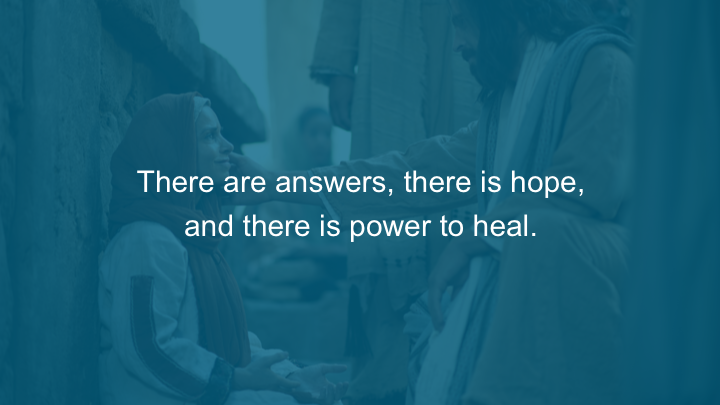
Your Voice Matters
So, what is our sacred and imperative duty to the rising generation and to the pure and heart?
- First, is to be true to the knowledge and testimony we have received and to the sacred covenants we have made. We cannot be a light, a guide, or a help to others unless we ourselves are strong and determined to remain so. We cannot illuminate the path if we are not on it.
- We must be an example of true discipleship, of Christlike service and love, reaching out with compassion and concern to others wherever they are on their faith journey.
- We must be students of the scriptures, quick to observe the teachings of the living prophets, able and ready to answer honest questions with faith and clear knowledge. There are answers to these questions and concerns. We need more Latter-day Saints who know and understand the truth and can help others find answers for themselves.
- We can support trusted organizations, like FairMormon, which are providing faithful answers to critical questions and independently responding to those who would attack, distort, or deceive.
- We must be a voice for truth. We must have the faith and courage to speak up and engage in social media in a positive, responsible, non-contentious, and effective way. We can simply share what we know and believe with others.
You can make a difference. Your voice matters.
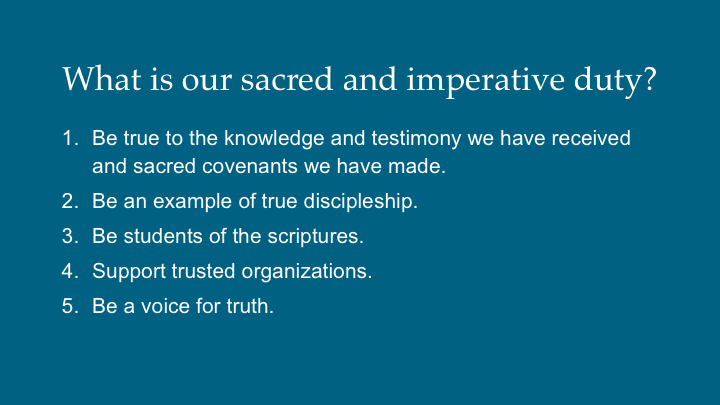
Faith is an Individual Choice
In the final analysis, faith is an individual choice. Because of the Atonement of Jesus Christ, all of God’s children are free to choose for themselves (2 Nephi 2: 27). “Faith is a gift from God bestowed as a reward for personal righteousness. The greater the measure of obedience to God’s laws…the greater will be the endowment of faith (Mormon Doctrine, 2nd ed. [1966], 264).
“Our main task is to declare the gospel to all the world and do it effectively. We are not obligated to answer every objection. Every man and woman eventually is backed up to the wall of faith, and there he or she must make his or her stand” (Ezra Taft Benson, “A Witness and a Warning,” 4-5).
Ultimately, it all boils down to this: Is the Book of Mormon is true? For if the Book of Mormon is true, then Jesus is the Christ, Joseph Smith was his prophet, The Church of Jesus Christ of Latter-day Saints is true, and it is being led today by a prophet and apostles receiving revelation. This is the critical knowledge that anchors our faith in Heavenly Father and in His Son Jesus Christ, and secures our determination to press forward, keeping their commandments and the sacred covenants we have made. Every other objection, issue and concern is secondary in importance and can be overcome or resolved though patience and persistence in due time if we remain faithful.
I close with these words of encouragement from our dear prophet, President Nelson, from his recent April Conference address entitled: “Revelation for the Church, Revelation for Our Lives.”
You don’t have to wonder about what is true. You do not have to wonder whom you can safely trust. Through personal revelation, you can receive your own witness that the Book of Mormon is the word of God, that Joseph Smith is a prophet, and that this is the Lord’s Church. Regardless of what others may say or do, no one can ever take away a witness borne to your heart and mind about what is true…I promise that as you continue to be obedient, expressing gratitude for every blessing that the Lord gives you, and as you patiently honor the Lord’s timetable, you will be given the knowledge and understanding you seek…We live in a world that is complex and increasingly contentious…If we are to have any hope of sifting through the myriad of voices and the philosophies of men that attack truth, we must learn to receive revelation…In coming days, it will not be possible to survive spiritually without the guiding, directing, comforting and constant influence of the Holy Ghost…I plead with you to increase your spiritual capacity to receive revelation.
I pray that each of us will be true and faithful to the end in following the Living Son of the Living God. And that each of us will be patient, compassionate, and supportive of others making their way along their own faith journey.
Q&A
Q 1: What are some of the other organizations that are trusted?
A 1: Don’t go crazy on this word, “trusted”. It’s important that these organizations are independent, but there are other organizations such as Book of Mormon Central, the Interpreter, More Good. Who am I forgetting? There are a number of them. And by the way, there they are filled with individuals like Scott who have spent their own time and their own resources to make this happen and they deserve more help from us.
Q 2: Do we have a green light to use these essays and these tips to use these resources?
A 2: Yes. You know what’s heartbreaking? Just when you hear about stake presidents [that] say, “I really don’t know if I can use these resources.” What? Yes, you can use them. Yes, you should use them. We need to get more resources in the hands of our youth, our missionaries and others because there are faithful answers to critical questions.
Q 3: Is the basis of your message borne out of your own personal concerns on this issue or are you sharing the message by assignment?
A 3: I’m here by assignment. I was invited to come. That invitation went to the assignment committee and the president of the Quorum of the Twelve assigned me to come and speak at this conference. So I’m a representative of the Church. I hope the Brethren agree with everything I’ve said today.
Q 4: What resources do you recommend most often when you are asked difficult questions?
A 4: I don’t know how to answer that. It depends on the question and on the situation, but there are a lot of them out there.
Q 5: How do you talk to a son who has left the church and has banned all discussion of religion in his home?
A 5: Short story, good friend of mine serving in a stake presidency with the son of President Hinckley. [A] member in the stake, [was] having terrible, terrible problems with their daughter. In this case it’d become so disruptive to the family, they did not know what to do. They went to the bishop. The bishop didn’t know what to do. They exhausted every other resource and finally went to the stake president and said, “You are the stake president. You have to help us. Will you come to our house?” So the three of them came to the house and just before they got there, the daughter just absolutely imploded. So when they opened the door, everybody was an emotional wreck. They sat down. The mother turned to the stake president and said, “You’ve got to help. What should we do?” Now you might’ve thought that President Hinckley would have said, “Well, my father is the President of the Church. Here’s what he would say.” That’s not what he said. He said, “I don’t know what you should do, but I’ll tell you what my mother would say. Whatever you do, do not lose that relationship with your daughter [or in this case, your son], whatever else. You lose that relationship and that basis of trust and love and you have nothing to go forward with, so if you have to put aside all of the conversation, you put it aside, but don’t lose that relationship with that child.” I’m sure Sister Hinckley would appreciate your applause on that.
Q 6: There is no place for faithful LDS to discuss their doubts or their suggestions for improvement. So people turn to the Internet and social media. What can the LDS Church do to create a safe place to discuss difficult issues? Is this what councils are supposed to do? …. It’s a very long question.
A 6: Look, we’re working to make more of these resources available; that’s one of my present responsibilities in the Church. The Church knows it needs to do more. We need to spend more resources. We need to address these platforms in a much more proactive and engaging way. So I’m not putting all the responsibility on you, but I am saying while we do that, will you help? In the meantime, we do want people to have places to go and just be, “I have a question. I have a concern. I need help”, and be able to get resources and discuss it, but if you’re listening to the First Presidency and the Twelve, they are encouraging conversation, open conversation about these issues as well.
Q 7: As a local Church leader, I often deal with adults and youth who have questions about history and doctrine. Is it okay for me to refer them to Book of Mormon [Central]?
A 7: Please do it, yes, yes, yes. But you need to know what’s on it first if you’re going to refer them to it, so leaders in the church need to go to these resources and become facile with them so that they can be effective and pointing others toward them. Or should I just stick to only official LDS resources? You’ve got to use both. You’ve got to use both. There is great stuff out there that’s not official correlated material, and it’s necessary and we want more of it.
Q 8: Why can’t the full-time missionaries get the FairMormon website?
A 8: I don’t know. It’s a good question. I’m not being flippant. It’s a complicated question, but yes, we do need to get more resources like this.
I think that’s enough. I’ve taken enough time. Thank you. You’ve been kind. It’s nice to be with you.
